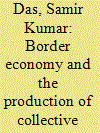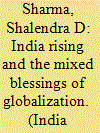|
|
|
Sort Order |
|
|
|
Items / Page
|
|
|
|
|
|
|
| Srl | Item |
| 1 |
ID:
134956


|
|
|
|
|
| Summary/Abstract |
In her position as a rising power, India has reassessed and reinvigorated the entirety of her relations with Africa in the past decade. These relations cover the economic, political and the security spheres. They are the result of India’s ideational foreign policy change, her economic growth trajectory, looming energy insecurity and India’s role as an increasingly important international stakeholder. The main argument of the article is that India has successfully worked out her own policies, institutional structures and inter-regional development schemes with unique characteristics to develop and deepen linkages with sub-Saharan Africa. The article concludes that India now has a potential of assuming the role of ‘game changer’ in the new scramble for Africa’s resources and the struggle for votes and support of African states in international institutions and fora.
|
|
|
|
|
|
|
|
|
|
|
|
|
|
|
|
| 2 |
ID:
134953


|
|
|
|
|
| Summary/Abstract |
While globalisation unleashes forces that the Indian State1 finds increasingly difficult to stop and contain, a variety of intermediate institutions has emerged in recent years ranging between a fully securitised State and a State integrated fully into the world economy. These obviously call new configurations of border and border economy into existence as much as contribute to the production of new and hitherto unknown political subjects. Border economy produces the community and not the other way round. Border trade is one of the many instrumentalities through which the flow of persons, goods and services is sought to be contained in order to help making the nation in the border. Ethnicity and ethnic identification serve as a technology for governing the unofficial trade and contributes to the production of ethnic subject. Besides, it is important to understand how a number of people eke out a living by taking advantage of differential pricing across the border. Thus, the labouring life of the subaltern has become an agent, and a moral community thus gets produced, bringing about, in the process, mutation in the dominant discourses of national security and functional integration.
|
|
|
|
|
|
|
|
|
|
|
|
|
|
|
|
| 3 |
ID:
134954


|
|
|
|
|
| Summary/Abstract |
Nigeria since 1960 when she emerged on the global scene as an independent country has evolved a culture of having representation across the world in the categories of temporary and permanent missions. This she has been doing to give effect to her desire for rapid development and hegemonic role on the African continent. Within a space of twenty years and occasioned by the oil boom that visited the country, a kind of explosion took place in the number of diplomatic missions that she had. This increase necessarily brought about two noticeable major developments; inadequacy in the number of Foreign Service Personnel and the urge to open more missions for more global recognition. In the decades of the 1970s and 1980s, the high number of missions did not generate any debate as the strength of the national economy was capable of carrying the burden associated with the missions.
However, the advent of the Fourth Republic in 1999 has raised the profile of diplomatic missions in the diplomatic circles. The cry for a reduction in the number of missions is loud enough to generate discomfort in the country’s Ministry of Foreign Affairs that prefers reducing the diplomatic staff strength. Another perspective exists that calls for the restructuring of the missions to achieve balance and give adequate recognition to the new dynamics in Nigeria’s external relations. All these dimensions have invariably weakened the consensus necessary to propel the foreign policy to a higher level of delivery.
The thrust of this article is therefore an engagement of the contending views on Nigeria’s diplomatic missions. It holds the view that the raging debate on what the country should do with her high number of diplomatic missions is unhelpful as it has the potential of sweeping crucial issues such as the development of a strategic vision for her foreign policy that derives from her location in the international system, the place foreign policy in governmental affairs, etc., that have produced discernible effects on the country’s foreign policy under the carpet. This is the position taken in the article.
|
|
|
|
|
|
|
|
|
|
|
|
|
|
|
|
| 4 |
ID:
134952


|
|
|
|
|
| Summary/Abstract |
India has been a major beneficiary of economic globalisation. Yet, integration into the global economy has also made India vulnerable to the unpredictable swings in market sentiment. Nevertheless, the ultimate effects of cross-border economic forces also depend on the robustness of domestic policies. Potential vulnerabilities such as disruption in trade or financial flows can be mitigated by sound macroeconomic policies. Although ‘licence raj’ and ‘export pessimism’ is now a thing of the past, India’s quasi-protectionist policies, coupled with the failure to deepen its integration into the global economy, have made the economy increasingly vulnerable to external forces—as seen when the United States Federal Reserve announced its decision to unwind its stimulus programme in mid-2013, resulting in deep sell-offs in emerging economies, especially India’s currency, bond and equity markets.
|
|
|
|
|
|
|
|
|
|
|
|
|
|
|
|
| 5 |
ID:
134955


|
|
|
|
|
| Summary/Abstract |
India and Bangladesh are interrelated in geopolitical relations but their core objectives are different. While geopolitical compulsions introduce the never-ending challenges of proximity to the two parties, including crucial issues of security, migration and resource sharing, Bangladesh is yet to form its own identity in which the perceived image of India figures predominantly, and the attitudes and expectations they develop towards each other shape the pattern of bilateral interactions between the two countries. Solutions to a number of vexed problems remain elusive and irritants in relations out-number gestures of goodwill. While the warmth in relations has frequently fluctuated with the change of regimes, a sustained pattern of uneasiness and mistrust persists. Analysed at three levels of geopolitics, attitudinal effects and functional exchanges, India–Bangladesh relations appear as a reflection of normal big country–small country power relations where policies are formulated on the basis of the primary principle of self-help but are further shaded by the quest for transforming itself into a nation-state by Bangladesh.
|
|
|
|
|
|
|
|
|
|
|
|
|
|
|
|
|
|
|
|
|